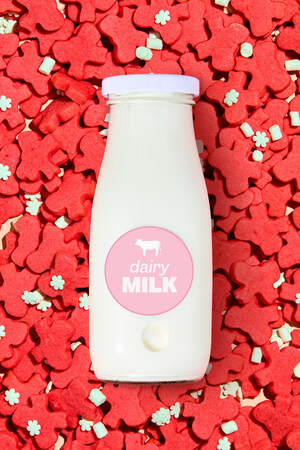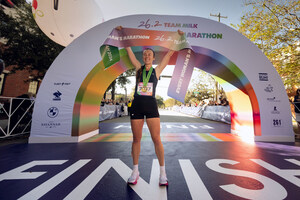New Study Finds Milk-drinking Kids Reap Physical Benefits Later in Life
Research finds kids who drank more milk have faster walking times and better balance as older adults
CHICAGO, Nov. 15, 2012 /PRNewswire/ -- Starting a milk drinking habit as a child can lead to lifelong benefits, even improving physical ability and balance in older age, according to new research. A new study published in Age & Aging found an increase of about one glass of milk a day as a child was linked to a 5% faster walking time and 25% lesser chance of poor balance in older age. The researchers suggest a "public health benefit of childhood milk intake on physical function in old age" – a finding that has huge potential for adults over 65, a population expected reach more than 70 million by the year 2030, doubling over just 30 years.
The team of British researchers used historical diet records from two large studies to assess the childhood habits of more than 1,500 men ages 62-86. They measured the impact of diet, specifically milk, protein, calcium and fat intake, on current performance and mobility in follow-up. Elderly participants were put through a series of activities, including walking, get-up-and-go, and balance tests. Childhood calcium, protein and milk intake were all associated with advantages in mobility later in life.
The researchers also found that childhood milk drinkers were also likely to be adult milk drinkers, emphasizing the benefits of establishing lifelong healthy habits. Among the many health habits to begin at a young age, experts recognize the importance of beginning the day with breakfast. In fact, studies show that milk drinkers and breakfast eaters have more nutritious diets than non-milk drinkers and breakfast skippers. Milk in the morning is a healthy habit that helps provide kids with nutrients they need for the day and benefits that extend well beyond the morning.
While decades of research support the bone-building benefits of milk, this is the first study to specifically find a physical performance benefit that can last a lifetime. Milk is the top food source of bone-building calcium and vitamin D in the American diet, and each glass provides 8 grams of high-quality protein. The 2010 Dietary Guidelines recommend two glasses of milk for toddlers (ages 2-3), 2.5 cups for children (ages 4-8), and 3 cups for adolescents, teens and adults Milk at breakfast is an ideal opportunity to help your kids start the day right, and get the recommended milk each day.
For more information, visit TheBreakfastProject.com
About the National Milk Mustache "got milk?"® Campaign
The Milk Processor Education Program (MilkPEP), Washington, D.C., is funded by the nation's milk processors, who are committed to increasing fluid milk consumption. The MilkPEP Board runs the National Milk Mustache "got milk?"® Campaign, a multi-faceted campaign designed to educate consumers about the health benefits of milk. For more information, go to www.TheBreakfastProject.com or Facebook.com/MilkMustache. Deutsch, A Lowe and Partners Company, is the creative agency for the National Milk Mustache "got milk?®" Campaign.
Source:
Birnie K, Ben-Shlomo Y, Gunnell D, Ebrahim S, Bayer A, Gallacher J, Holly JMP, Martin RMl. Childhood milk consumption is associated with better physical performance in old age. Age & Aging. 2012;41:776-784.
SOURCE MilkPEP
WANT YOUR COMPANY'S NEWS FEATURED ON PRNEWSWIRE.COM?
Newsrooms &
Influencers
Digital Media
Outlets
Journalists
Opted In






Share this article